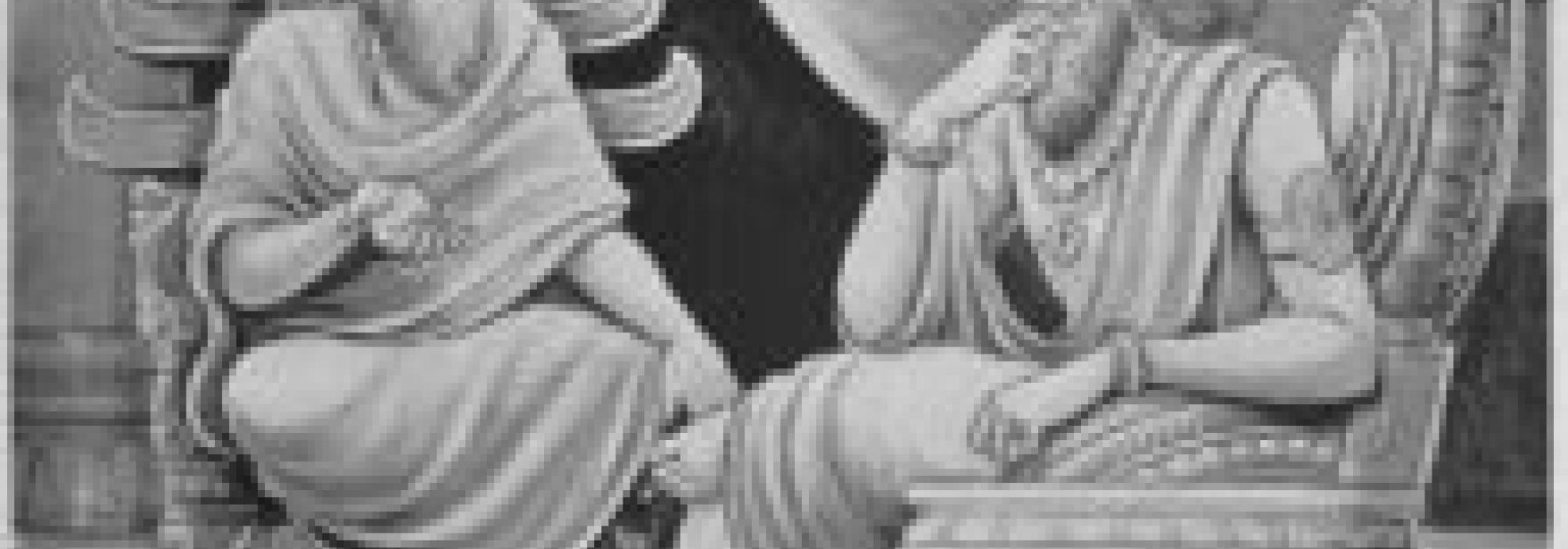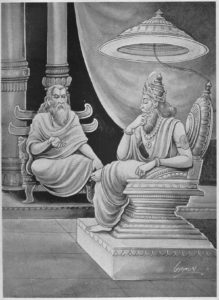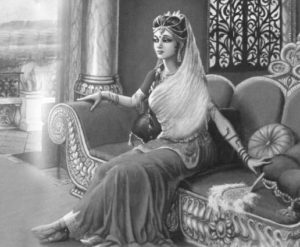Duryodhana’s spies brought news that Draupadī was married off to the Pāṇḍavas; the archer who bent the bow, strung it, and shot the target was none other than Arjuna; the one who lifted and whirled Śalya, uprooted trees, and vanquished everyone in combat without himself losing his composure was Bhīma. The kings who had assumed that the Pāṇḍavas had perished in the fire that burnt down house of lac were overjoyed when they heard about the escape of the Pāṇḍavas and their moving about in the guise of brāhmaṇas; they felt that the Pāṇḍavas had been reborn; for having ordered Purocana to engage in such a vile act, they rebuked Bhīṣma and Dhṛtarāṣṭra. Duryodhana was filled with anguish. Duśśāsana said in a voice choked with hesitation, “Had he not been in the guise of a brāhmaṇa, he would have never won Draupadī’s hand; who knew indeed that he was Arjuna? Destiny is great, O brother! Valour has been of no use at all; Fie! If the Pāṇḍavas are indeed alive, then what have we achieved with our valour?” Speaking with each other in this manner and cursing Purocana, all those who had come to the svayaṃvara returned to Hastināpura with long faces; now the Pāṇḍavas have become radiant and powerful; they are now allies of Drupada; they also have the support of Dṛṣṭadyumna, Śikhaṇḍī, and the other sons of Drupada as well as their friends and relatives; due to this, along with the initial dampening of enthusiasm for Duryodhana, he also developed jealousy and was filled with dread.
Having learnt of all this and seen for himself, Vidura rushed to Dhṛtarāṣṭra and said, “Brother! Thanks to good fortune, the children of the Kuru dynasty are growing in prosperity!” The blind king replied, “O it is good fortune indeed! A blessing indeed!” and expressed his delight. He was under the illusion that Duryodhana had won the hand of Draupadī; therefore he sent word for Duryodhana and said, “Offer many clothes and ornaments to Draupadī and bring her here!” Vidura then told him, “Draupadī has chosen the Pāṇḍavas; they are alive and well. They are being honoured by Drupada.” Dhṛtarāṣṭra concealed his true emotions and said, “Vidura, then that is a matter of greater joy for me; I am extremely fond of Pāṇḍu’s children; I am delighted to know that they are in good health and have found a powerful friend like Drupada!” Vidura said, “O king! May you always have such an attitude!” and went away. After he left, Duryodhana and Karṇa told Dhṛtarāṣṭra, “O king! We were unable to speak in Vidura’s presence; now there’s nobody else; therefore I speak now; do you know what you are doing? You’re praising the Pāṇḍavas in front of Vidura – what does this mean? Do you want our cousins to grow and become prosperous? You speak something so different from what we’re supposed to do! We constantly have to think of means to break their strength, if we wish to prevent them from swallowing all of us – we, our children, our family, and friends”. Dhṛtarāṣṭra said, “Child, I too think on the same lines as you do; but I do not desire to display that in front of Vidura; therefore, in a bid to conceal my true thoughts from him, I keep praising the Pāṇḍavas and their qualities in his presence. Duryodhana said, “We should send crafty brāhmaṇas who can skillfully create a divide among the sons of Kuntī and those of Madrī; we can offer a great deal of wealth to Drupada and get him, his sons, and his ministers to abandon Yudhiṣṭhira; we can get people to describe all the flaws and defects of our kingdom so that they never return; we can accuse Kṛṣṇā of sins and blemishes, thus creating disgust in their hearts; since she has multiple husbands, that should be easy; we can get Bhīma killed by deceit; he is the true strength of the Pāṇḍavas; without him by their side, they will never try to win over the kingdom; it is due to his support that Arjuna is still unvanquished; without Bhīma, Arjuna cannot match even a quarter of Karṇa; we can send them many beautiful damsels and we can make them all get disgusted with Draupadī; we can invite them here and on the way, we can get our trustworthy mercenaries to kill them. Whichever of these strategies you blemishless, let us undertake that at once; else, time will fly away; whatever we do, we have to do before their bond with Drupada becomes strong. This is what I think about controlling the Pāṇḍavas. What do you think about this, Rādheya?” In response, Karṇa said, “Duryodhana, I don’t think your strategies are right. First of all, it is impossible to bring them under control by means of strategy; it was impossible even when they were living under our roof, next to us, as fledglings without fully-developed wings; now, when they have grown in might and prosperity, and are living in a foreign land, do you think it will be possible to trick them? Second, it is not possible to trap them with vices such as gambling and others, for they are fortunate people; they have an eye on the ancestral property. Third, since they are all married to the same woman, it is impossible to create divide between them. Fourth, Draupadī accepted them and lost her heart to them even when they were poor; now as they tread the path of prosperity, will she disregard them? Fifth, Drupada is a man of character; he doesn’t crave for wealth. Even if you offer large kingdoms to him, he will not abandon the Pāṇḍavas; his son is also like him; a man of good qualities; he is attached to the Pāṇḍavas. Therefore, we cannot control or defeat them through trickery; what is indeed possible is to wage a terrible war against them before they develop strong roots and destroy them with valour. We should do this at once – when our side is still strong and mighty while the Pāñcāla army is small and weak. We must strike them before they assemble together chariots and friends, before Drupada and his sons begin to look around for resources, and before Kṛṣṇa sends his entire Yādava army to join forces with them.[1] In the days of yore, Bharata subjugated the earth through his valour; Indra conquered the three worlds by his valour; indeed valour is a quality that is praised in kṣatriyas; it is the svadharma of heroes. Therefore let us, at once, take our four-division army[2] and attack Pāñcāla; we shall defeat Drupada and bring the Pāṇḍavas here as prisoners. They will not buckle under sāma, dāna, or bheda; it is only by defeating them with valour will the entire kingdom be yours; I can see no other path to this end.” Dhṛtarāṣṭra said, “Karṇa! You are intelligent and skilled in the use of weapons; therefore, it is only appropriate that you utter such words of valour; however, let us listen to what Bhīṣma, Droṇa, and Vidura say about this; all of you think about how we can live in peace and what will lead to our welfare!”
When they called for a meeting with Bhīṣma, Droṇa, and other elders, Bhīṣma said, “I can’t stand the thought of waging a war against the Pāṇḍavas; I don’t like it one bit. Just as you are dear to me, so was Pāṇḍu; to me Kuntī’s children are the same as Gandharī’s children. Just as I must protect them, you must protect them too. Therefore, let us not fight with them! Duryodhana, make peace with them and give them half this kingdom of their father and ancestors! Just as you deem this kingdom as your ancestral property, the Pāṇḍavas too think of it as their ancestral property. And if they don’t get half of the kingdom, how will you get your share? You have received this kingdom through dharma; in my opinion, they have received this kingdom before you. Therefore, treading an amicable path, give them half of the kingdom; this will be in the best interests of everyone; instead, if you tread a different path, it will definitely not bode well for us; you will also earn a bad name. One must protect his honour and reputation; indeed one’s honour is a great strength; the life of a dishonourable man is a waste; even if he’s alive, he’s as good as dead. Therefore, tread the path of dharma. Dharma is something that has always been a part of the Kurus; dharma befits you and your ancestors; it is due to good fortune that the Pāṇḍavas are still alive and Pṛthā is still alive; that sinful Purocana’s desires did not attain fruition; when I heard about the horrific episode, I did not wish to even show my face to man or beast; the people of the world would rebuke you more than they rebuked Purocana; it is because the Pāṇḍavas escaped unhurt that you have a chance to repent for your sin; they are heroes; as long as they are alive, even Devendra cannot stop them from getting their rightful share of the kingdom of their father and ancestors. They are living a life of dharma; they are living in harmony and of one mind. It is adharma to drive them away from a kingdom in which they have a share equal to yours. If you want to adhere to dharma, if you want to do that which pleases me, and if you want to do that which brings welfare to all, then given them half the kingdom!” Droṇa told Dhṛtarāṣṭra, “O king, I have heard that the people who are called for counsel should always speak words that are dhārmic, well-meaning, and leading to honour. My opinion is the same as that of Bhīṣma; it is dharma to give a share to the Pāṇḍavas; therefore send at once to the court of Drupada a gifted diplomat who can speak friendly words. Let him take precious gems and ornaments with him and gift it to them; let him repeatedly tell Drupada and Dṛṣṭadyumna that both you and Duryodhana are extremely pleased with the newly-formed marital ties and that they are of the opinion that great prosperity will come out of this relationship; let words of solace be spoken again and again to the Pāṇḍavas so that they are reassured; from your side, gift Draupadī many radiant golden ornaments. In this manner, let us assuage any doubts of Drupada and the Pāṇḍavas and after they are satisfied, let us invite them here. If they agree to come, let Duśśāsana and Vikarṇa go there along with their retinue and escort them here. Once they come here, let them lead an honourable life, enjoying their ancestral property with the express support of the people. This is what you must get your sons to do – I find this to be the best way.”[3]
Notes:
[1] Translators’ Note: At this point, Karṇa also says, “O King, there is nothing that Kṛṣṇa will not sacrifice for the sake of the Pāṇḍavas – be it wealth, objects of pleasure, or even his kingdom.”
[2] Typically an army had four divisions (Caturaṅga) – chariots, elephants, infantry, and cavalry.
[3] Translators’ Note: At this point, Karṇa says, “Bhīṣma and Droṇa have lived off your money and yet they advise you against your good – what a surprise! How can we take the counsel of an evil-hearted person who appears to do us good while hiding his true intent? During the hour of crisis, a man’s friends can neither harm nor help; his future depends on his fate alone. King Ambuvīca, who lived in Rājagṛha and ruled over Magadha, was bereft of skill or talent; he merely took breaths. Mahākarṇi, his minster, began ruling the kingdom instead. He snatched away everything that belonged to the king and his greed increased. Such is the nature of ministers and advisors to kings. However, in spite of all his attempts, Mahakarṇi could not take the kingdom away from Ambuvīca. Fate had decreed that he would be king. So also, if it is your destiny, this kingdom will be with you, even if the three worlds become your enemies. If not, it will never be with you, O king. Use your wisdom before listening to the counsel of your ministers!”
To be continued…
This is an English translation of Prof. A R Krishna Shastri’s Kannada classic Vacanabhārata by Arjun Bharadwaj and Hari Ravikumar published in a serialized form. Thanks to Śatāvadhāni Dr. R Ganesh for his thorough review and astute feedback. Additional segments from the epic and notes by the translators have been added in the footnotes after going through the Critical Text of the Mahābhārata.



















































